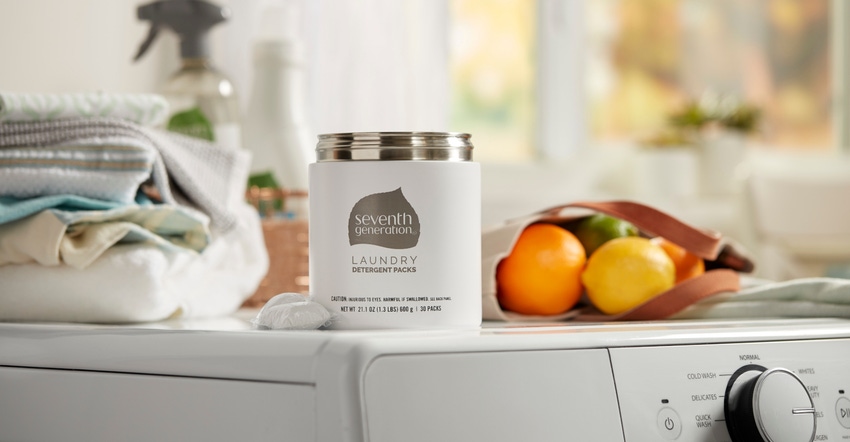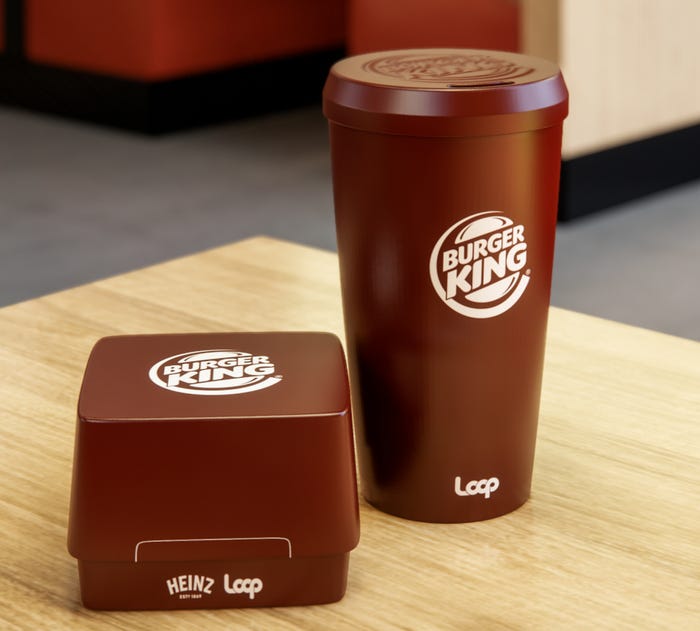TerraCycle’s milkman-like delivery model, Loop, expands online and at brick-and-mortar locations.

Following a successful pilot program that started in 2019, the Loop circular shopping platform from TerraCycle has expanded its online operation to provide an unlimited number of US consumers from coast to coast with home delivery of products packed in reusable packaging, as well as pickup of the empty packages.
Loop also made its brick-and-mortar debut recently, in France. “Carrefour just brought Loop into its first store,” says Eric Rosen, publicist, US public relations, for Loop/TerraCycle. “We anticipate Loop being in-store in other retailers in 2021.” Carrefour’s online Loop service launched in Paris last year.
In the United States, consumers will find Loop products at Kroger stores starting in 2021. Also in North America, Burger King and Tim Hortons restaurants plan to launch Loop pilot projects next year.
*************You might also be interested in listening to the 20-minute podcast where TerraCycle CEO Tom Szaky tells Packaging Digest's Lisa Pierce about the challenges of Loop's expansion, the COVID-19 impact, and plans for the future.*************
Loop’s online scale-up coincides with an explosion in internet shopping and home delivery fueled by the COVID-19 virus, though it’s also a natural next step considering the success of the pilot program. More than 100,000 people have signed up for the service to date.
With the online version of Loop, consumers buy products that have been filled into reusable packaging made, for example, of metal or glass. They then return the empty packages to Loop, which cleans the packages for refilling by Loop’s brand partners.
Loop packs consumer orders into reusable totes for delivery, and consumers return the empty packaging to Loop using the same totes. Loop products are packed and shipped from the company’s New Jersey warehouse to all US ZIP codes. (Frozen products are only shipped to locations where delivery can be made within 24 hours.)
The platform launched in 2019 as a pilot program in the Mid-Atlantic United States and Paris, France. In July 2020, Loop launched online in the United Kingdom, working in partnership with retailer Tesco. A Canadian online launch is planned for Toronto in February 2021.
Loop has expanded rapidly vis-à-vis brand partners and product selection, now offering more than 80 brands and 400 products in the United States and Europe. Product categories include grocery, beauty, health and personal care, and household essentials. Brand owners range from giants like Nestlé and Procter & Gamble to start-ups like Soapply.
Next year will be an important one for Loop in brick-and-mortar restaurants and stores. Burger King plans to start a pilot Loop program in 2021 that will offer eat-in and to-go customers sandwiches and drinks packed in returnable, reusable food containers and cups.

Consumers who choose the reusable packaging will pay a deposit when they place their order and get the deposit back after returning the packaging to Burger King. The pilot will start in select Burger King restaurants in New York City; Portland, Oregon; and Tokyo, with additional cities to join in the months that follow.
Canada’s Tim Hortons quick-service restaurant chain has announced a similar Loop pilot. The program will start in 2021 at select Tim Hortons restaurants in Toronto.
Also starting next year, US consumers will be able to visit Loop in-store at select Kroger locations. The plan for Loop in brick-and-mortar stores is not only to sell Loop products but also to collect the empty packaging for cleaning and reuse.
Loop publicist Rosen discusses the program’s burgeoning expansion, both online and in-store, in this exclusive Packaging Digest Q&A.
How many brick-and-mortar retailers in the United States will be selling Loop products in 2021? Is this a channel Loop is interested in exploring further? What have consumers said about their willingness (or not) to take empty packages back to a physical store?
Rosen: As of now, in the United States, there will be one brick-and-mortar retailer, Kroger, selling Loop products in-store in 2021. There are, however, many retailers who are and will be integrating Loop into their ecommerce platforms.
Yes, [in-store] is a channel Loop is pursuing and will continue to pursue. In fact, Loop just opened in its first brick-and-mortar retailer — Carrefour in France.
As for consumers’ willingness to take empties back to a physical store, while we haven’t surveyed consumers, we believe returning empty packaging will be embraced.
When will Loop be expanding into additional markets in Europe and Asia, either online or via brick-and-mortar stores?
Rosen: Loop will be launching in Canada, Australia, and Japan in 2021. We will continue to seek opportunities to launch in other countries and will be announcing more as we solidify plans.
How will Loop, brand owners, and/or retailers educate consumers about how in-store Loop works and its benefits?
Rosen: Loop, brand owners, and retailers educate consumers through websites, social media, and earned media placements in outlets worldwide.
Now that the Loop program is national in the United States, how many locations are cleaning the empty, returned packages?
Rosen: In the United States, the cleaning facility is in Pennsylvania. We will be adding facilities as we scale.
What, if anything, has changed in the logistics of the Loop program (outgoing and incoming packages)? What, if anything, has changed with the lifecycle analysis of the packages sold in the Loop program because of the additional distances?
Rosen: Nothing has changed in the logistics. Based on Loop’s third-party lifecycle analysis, creating a durable (or “reusable”) container uses more energy and resources than creating a disposable (or “single-use”) container. However, over time, the reusable container has a lower environmental and economic cost, as it does not need to be remanufactured on every use.
Instead, it is transported and cleaned, which is a much lower environmental cost. According to Loop, the efficiency of a reusable package in Loop is even more evident as consumers participate repeatedly. After two to three uses of the packaging, the environmental impact is breakeven. By 10 uses, there is a more than 35% reduction in environmental impacts.
Are all products still being shipped to consumers from Loop’s New Jersey warehouse? Is that still the plan moving forward, to have just one warehouse?
Rosen: Loop’s New Jersey warehouse ships all products in the United States. As we scale, we intend to have additional warehousing in other parts of the country.
The Loop warehouse in France is in Lille, and the one in the United Kingdom is in Crick.
How well are the durable packages holding up to use, cleaning, and reuse? Are the brands getting the number of uses they hoped they would?
Rosen: The durable packaging is holding up well as it goes through Loop cycles. I can’t comment on the brands, and what their expectations were/are.
Is UPS still Loop’s only partner for deliveries/pickups? Are there any plans for additional delivery services to be involved, especially as volumes and delivery areas are growing?
Rosen: Yes, Loop’s US logistics partner is UPS. In France, it’s Colisweb, and in the UK, it’s DPD. There are no plans for additional delivery services to be involved.
The allergen warning on the Loop website states: “Please note that the Loop Tote is packed in a facility that may have handled wheat, milk, eggs, tree nuts, peanuts, and soy, and may contain traces of the same. If you or someone in your family has a serious food allergy, Loop may not be for you.” Are there any plans to address this, so people can safely order Loop products without worry from allergens?
Rosen: There are no current plans to address this.
Who designs the Loop packages?
Rosen: Each brand partner is responsible for the design of its packaging. All packaging must be approved by Loop.
What is the size range of Loop packages?
Rosen: The smallest container is 20 ml (less than an ounce) for Tea Tree Oil from The Body Shop. The biggest package is an 8-lb container for kitty litter from Purina.
How have consumers reacted to Loop since its launch last year?
Rosen: We have had an overwhelmingly positive response to Loop since its launch. In fact, meeting consumer demand is what led to the rapid expansion — from 10 states to every ZIP code in the contiguous 48 states. We have more than 100,000 sign-ups, and that continues to grow.
About the Author(s)
You May Also Like




